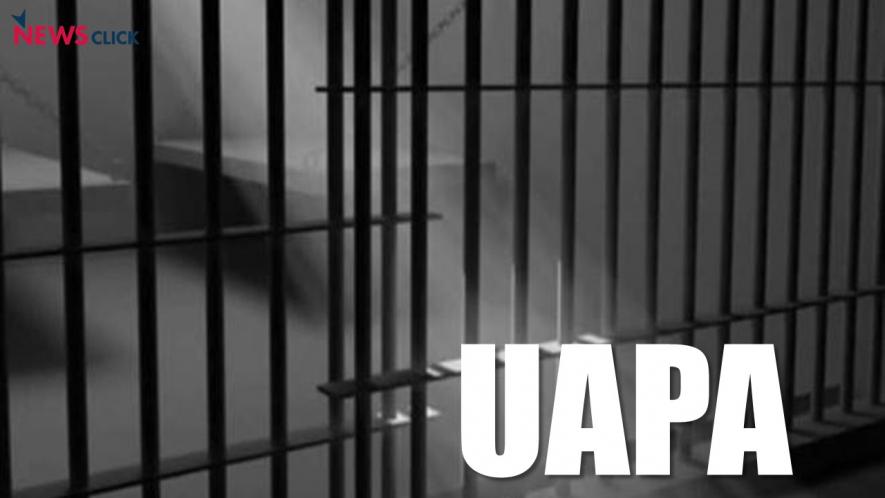5,128 Cases Under UAPA Since 2015, 72% Rise in Last Five Years

As many as 5,128 cases under the stringent anti-terror law UAPA and 229 on charges of sedition have been lodged across the country in a five-year period from 2015, the Parliament was informed on Wednesday.
Manipur topped the charts in terms of cases lodged under the Unlawful Activities (Prevention) Act with the north-eastern state alone accounting for 1,786 or 34.82% of the total cases.
Minister of State for Home Affairs G. Kishan Reddy tabled the data for the period between the years 2015 and 2019 in response to a query by Rajya Sabha MP Abdul Wahab.
The data, updated till December 31, 2019, was based on a compilation by the National Crime Records Bureau (NCRB), Reddy stated.
A total of 897 cases were lodged under the UAPA in 2015 followed by 922 in 2016, 901 in 2017, 1,182 in 2018 and 1,126 in 2019, it showed.
According to the data, 30 cases were lodged on charges of sedition in 2015 followed by 35 in 2016, 51 in 2017, 70 in 2018 and 93 in 2019.
Manipur lodged 522 cases under UAPA in 2015 followed by 327 in 2016, 330 in 2017, 289 in 2018 and 306 in 2019 – the maximum among all states and union territories during the period except for 2018, when Assam had 308 such cases, it showed.
In terms of sedition cases, Bihar topped the list in 2015 with nine such cases followed by Haryana in 2016 with 12 cases, Assam in 2017 with 19, Jharkhand in 2018 with 18 and Karnataka in 2019 with 22 cases.
Reddy replied in the negative on whether it was also a fact that the provision of UAPA is being used callously against minorities and backward sections of the society.
According to The Hindu, there has been a 72% rise in persons arrested under the UAPA in 2019 as compared to in 2015. It mentioned that 1,948 persons were arrested under the act in 1,226 cases in 2019. The number of arrests were 1,128 in 2015, 999 in 2016, 1,554 in 2017 and 1,421 in 2018.
In addition, according to the Crime in India Report compiled by the National Crime Records Bureau (NCRB) for 2019, only 2.2% of cases registered under UAPA between 2016 and 2019 ended in convictions by courts.
On February 1 this year, the Supreme Court said that a constitutional court could grant bail to an accused under the UAPA on grounds that their fundamental rights had been violated, notwithstanding the rigors of Section 43D(5) of the UAPA which prohibits bail if the court was safe in the knowledge that the allegations against the accused were prima facie true.
“Once it is obvious that a timely trial would not be possible and the accused has suffered incarceration for a significant period of time, Courts would ordinarily be obligated to enlarge them on bail,” a three-judge bench of the apex court had said.
On March 7 a Surat court acquitted 127 Muslim men arrested under UAPA in 2001 for participating in a meeting allegedly organised to promote the Students Islamic Movement of India (SIMI). The court said that the evidence against the accused “were not reliable or satisfactory enough.”
“My career is not all that I lost over twenty years. Despite being out on bail the police continued to harass me. I would be detained every year during the Rath Yatra in Ahmedabad or during a VIP visit. The police used to brazenly turn up at my home at any time of the day just to check in on me. Friends and neighbours had distanced themselves from me…,” Asif Sheikh, now 52 years old, had told Newsclick.
Those arrested under the UAPA include activists in the Bhima Koregaon case; 83-year-old tribal rights activist Stan Swamy is one among sixteen people arrested in connection with the case. Pinjra Tod activist Devangana Kalita was also arrested under the same law, as was activist Umar Khalid.
On Wednesday, a committee comprising prominent personalities from different fields sought the immediate release of former Delhi University professor G.N. Saibaba, who is serving a life term in Nagpur Central Prison for alleged Maoist links, on medical grounds. Saibaba, who is wheelchair-bound with over 90% physical disability, had tested positive for COVID-19 on February 12. He was also charged with sections of the UAPA.
“The entire process is conducted as though I was a dreaded terrorist or a criminal. The police could have enquired with me whatever they wanted to, either by sending a police official or calling me to the Police Station. But the entire intention is to create an atmosphere of terror and project that I had already done some dreaded crime,” Anand Teltumbde, one of the activists arrested in the Bhima Koregaon case, wrote for Newsclick in 2018.
With PTI Inputs
Get the latest reports & analysis with people's perspective on Protests, movements & deep analytical videos, discussions of the current affairs in your Telegram app. Subscribe to NewsClick's Telegram channel & get Real-Time updates on stories, as they get published on our website.
























